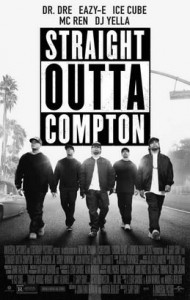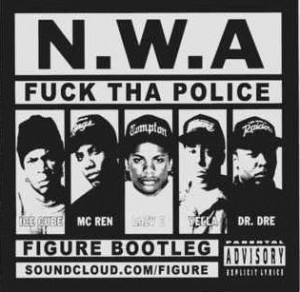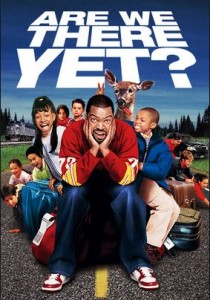 After the huge opening weekend scored by Straight Outta Compton, the biopic directed by F. Gary Gray, about the birth and rise of the Gangster Rap group N.W.A., Hollywood and social media are buzzing with possibilities and "what if" scenarios. How big will it be? How much money will it take in? Will it be successful internationally as well as domestically? Well given that after just 3 days at the box office, it had already broken a number of records, including biggest opening for musical biopic, and the largest opening for a movie explicitly targeted at Black audiences, and is anticipated to break a number of others.
After the huge opening weekend scored by Straight Outta Compton, the biopic directed by F. Gary Gray, about the birth and rise of the Gangster Rap group N.W.A., Hollywood and social media are buzzing with possibilities and "what if" scenarios. How big will it be? How much money will it take in? Will it be successful internationally as well as domestically? Well given that after just 3 days at the box office, it had already broken a number of records, including biggest opening for musical biopic, and the largest opening for a movie explicitly targeted at Black audiences, and is anticipated to break a number of others.
Of course it doesn't take a Wall Street analyst to understand how Straight Outta Compton could be so successful. With the reach of the social media networks of Ice Cube, Dr. Dre, and others, coupled with strategically placed advertisements, a legitimate marketing strategy/budget dedicated to getting the word out, a glaring lack of diversity in this summer's movie offerings, and the historical significance of N.W.A. in shaping hip hop and the culture surrounding it, it would have been more surprising for this film - budgeted at $29M - to not do well.
Time will tell whether the success of this movie will loosen the purse strings of production companies, and serve as leverage for more Black films. -In case you didn't know, Hollywood does not distinguish between romance, horror, action, scifi, comedy, etc. and considers all Black movies to be part of one large genre; Black movies. So criticisms aside, we are all rooting for Straight Outta Compton to do very well.
Now that we've finished singing Kumbaya, and counting ticket stubs, here is what I don't like about this project. It isn't the script, or the acting, or the direction. Actually, the film was adequate in all the aforementioned areas.
Having grown up in the 80's, I am quite familiar with the environment which spawned N.W.A. In the midst of the War On Drugs, when many state an local governments empowered special police units to deal with the epidemic of gangs and drugs that held many inner cities with an iron grip. In Los Angeles, there was the CRASH program. In Oakland there was the Task Force. Different cities had different names and packaging, but the same basic program rules applied. Said programs involved policing practices aimed at reducing drug activities and drug related crimes, but as they were to be administered through the skew of institutionalized racism, they inevitably resulted in racial profiling with young black males as the primary target.
 As the anger and frustration behind racial profiling and police brutality continued to build, and calls for change and action fell on deaf ears, N.W.A. found themselves in the right place at the right time, and became the voice and validation of a neglected population. Unfortunately, the success of N.W.A., and their groundbreaking, genre building musical success, opened pandora's box. Record companies, salivating over the profit potential of a new untapped genre, quickly sought out and signed artists that appeared to be or claimed to be gangster. Then, suddenly, from coast to coast, everyone was trying to fit the mold; Da Lench Mob, Geto Boys, Cypress Hill, Onyx, Wu Tang Clan, Young Murder Squad, Booyah Tribe, and the list literally goes on and on and on...with each new one trying to be harder than the last.
As the anger and frustration behind racial profiling and police brutality continued to build, and calls for change and action fell on deaf ears, N.W.A. found themselves in the right place at the right time, and became the voice and validation of a neglected population. Unfortunately, the success of N.W.A., and their groundbreaking, genre building musical success, opened pandora's box. Record companies, salivating over the profit potential of a new untapped genre, quickly sought out and signed artists that appeared to be or claimed to be gangster. Then, suddenly, from coast to coast, everyone was trying to fit the mold; Da Lench Mob, Geto Boys, Cypress Hill, Onyx, Wu Tang Clan, Young Murder Squad, Booyah Tribe, and the list literally goes on and on and on...with each new one trying to be harder than the last.
But, what of the originators? The pioneering N.W.A.
Well, it is the music business, right? So, once you factor in the dynamic of multiple personalities in a musical group, along with the variables of fame, power, money, and egos, and it is generally only a matter of time before the group splits, so N.W.A. inevitably dissolving into several entities is no surprise. And, given the magnitude of their impact, it is also no surprise that the key principals moved onward and upward to bigger and better opportunities. Although you can't capitalize on bigger and better opportunities and still be gangster, right? Or can you?
 Hmm, what's that called again, when you sell a bill of good to your people, just to make a buck, knowing that it's not only a lie, but one that is to their detriment? Oh yeah, it's called being a sellout.
Hmm, what's that called again, when you sell a bill of good to your people, just to make a buck, knowing that it's not only a lie, but one that is to their detriment? Oh yeah, it's called being a sellout.
No matter, the gangster rap machine is set in motion, and has been steadily cranking out product and revenue, and supporting peripheral industry(such as private prisons), and creating jobs (like law enforcement and slave labor). Thousands of today's(and yesterday's)black youth are caught up in the system as a result of having been seduced by the glamorization of the gangster lifestyle(enabled by many compromising factors, not the least of which are principles of white supremacy and institutionalized racism).
I know what you're thinking. It's not their fault. It's not their responsibility, as they were just artists and performers, and had no idea what their impact would be. They didn't have the benefit of hindsight. They weren't responsible for the factors and environment that makes so man young minds susceptible. They would do things differently, and be accountable, if they knew then what they know now. They were just some ghetto kids from Compton, Right? Well, Yes, except for O'Shea "Ice Cube" Jackson, Sr. who is actually from Baldwin Hills.
What about now, 25 years after the debut of N.W.A.? Shouldn't the story speak to any of the negative aspects to their impact on the Black community? Must we continually ignore the lack of conscience, and just go along to get along? Continue to misguide through selective memory and omission?
N.W.A. once stood for something that was needed, at a time that it was missing. I propose that it should now stand for something else.

